The Critical Role of Family in Senior Mental Wellbeing
As the population ages, the importance of family involvement in senior mental health care becomes increasingly evident. Research indicates that family members are fundamental in reducing loneliness, supporting treatment adherence, and enhancing overall quality of life for older adults. This article explores comprehensive strategies, practical approaches, and effective resources to encourage meaningful family participation, ensuring seniors receive empathetic, coordinated, and effective mental health support.
Understanding Family Roles in Elder Mental Health Support and Caregiving
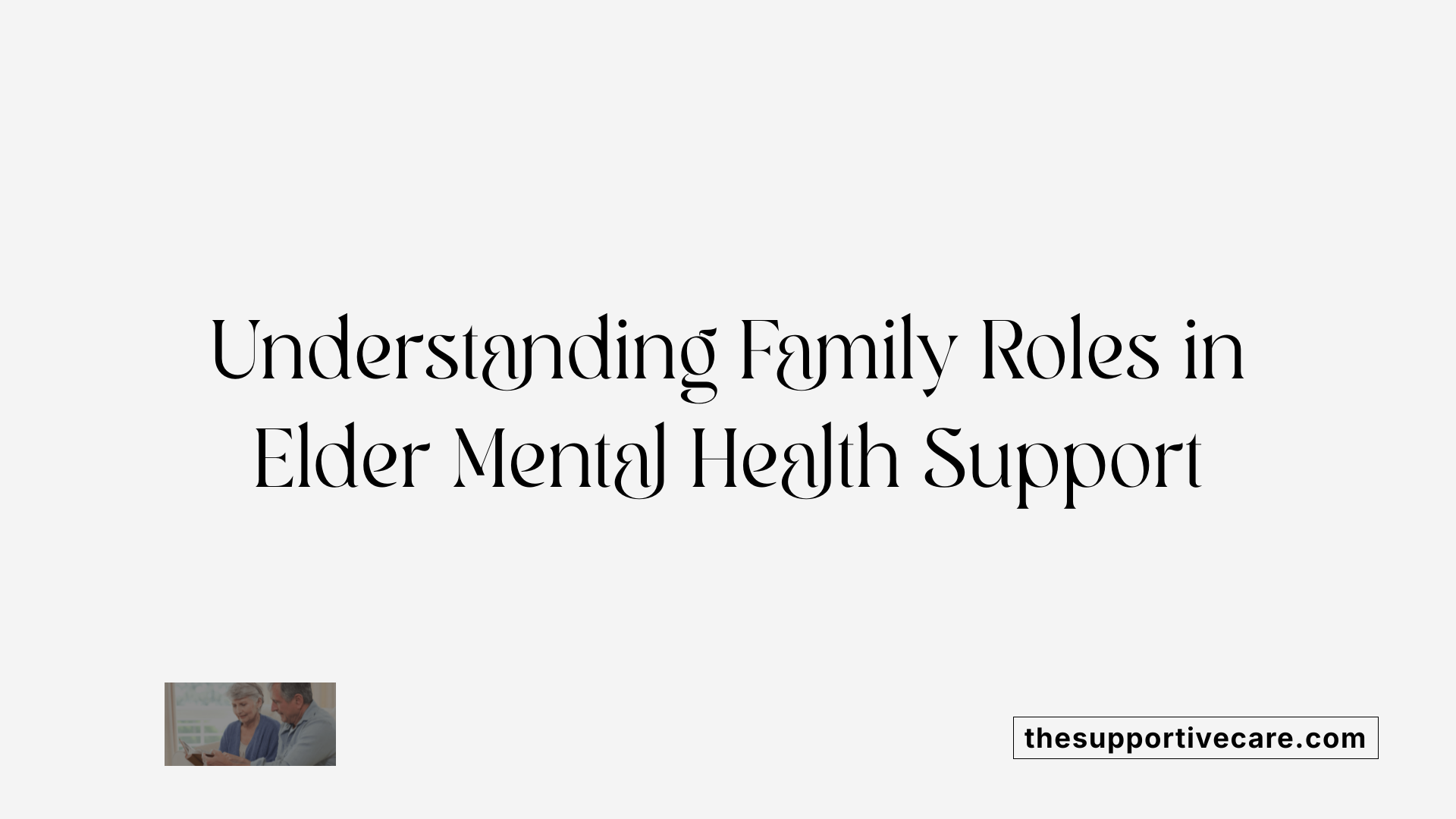
What roles do family members play in elder mental health support and caregiving?
Family members are central to supporting the mental health and overall well-being of older adults. They provide crucial emotional support, which helps seniors feel valued, understood, and less lonely. Fostering positive relationships and encouraging social engagement can counteract feelings of isolation, depression, and cognitive decline.
In practical terms, family caregivers assist with daily activities such as eating, dressing, and mobility. They also manage medication schedules and help navigate complex healthcare systems, ensuring that seniors follow their care plans effectively. These efforts promote better health outcomes and enhance quality of life.
Open communication within families is vital. It helps address emotional and psychological needs, resolve conflicts, and establish a stable, supportive environment. Clear roles and shared responsibilities reduce stress and prevent burnout among caregivers.
Education on mental health needs enables family members to recognize early warning signs of issues like depression or cognitive decline. Using community resources, support groups, and healthcare programs further amplifies their capacity to provide effective care.
Caregivers should also prioritize their own well-being through self-care practices. Recognizing signs of caregiver fatigue and seeking community support help sustain their vital role.
Ultimately, family involvement encompasses both caregiving tasks and emotional advocacy, making a profound difference in maintaining the mental health and dignity of older adults.
The Benefits of Family Involvement in Elder Care
What are the importance and benefits of family involvement in elderly mental and physical health care?
Family involvement plays a vital role in supporting the health and wellbeing of older adults. It enhances emotional bonds and provides seniors with the social support necessary to maintain a positive outlook and resilience. When family members actively participate in care, it leads to better adherence to treatment plans, healthier lifestyles, and safer medication management.
Research shows that engaged families help reduce feelings of loneliness and social isolation. These feelings are linked not only to mental health issues like depression and anxiety but also to cognitive decline and the progression of diseases such as Alzheimer’s. Regular family visits and social interactions also stimulate cognitive function by evoking long-term memories and encouraging participation in physical and mental activities.
Family members serve as advocates and coordinators, ensuring that seniors attend appointments, follow prescribed treatments, and understand their health conditions. This collaborative approach results in fewer hospital visits, quicker recovery times, and improved quality of life. It also supports advanced care planning and decision-making, respecting the elder’s wishes and dignity.
Moreover, family involvement fosters a sense of security and belonging, which can enhance mental health and overall resilience. By providing emotional support, companionship, and practical assistance, families create a stable environment that promotes physical activity, healthy nutrition, and mental engagement. These combined benefits significantly contribute to healthier aging, reinforcing the crucial role families play in elder care.
Effective Inclusion of Family in Senior Care Plans
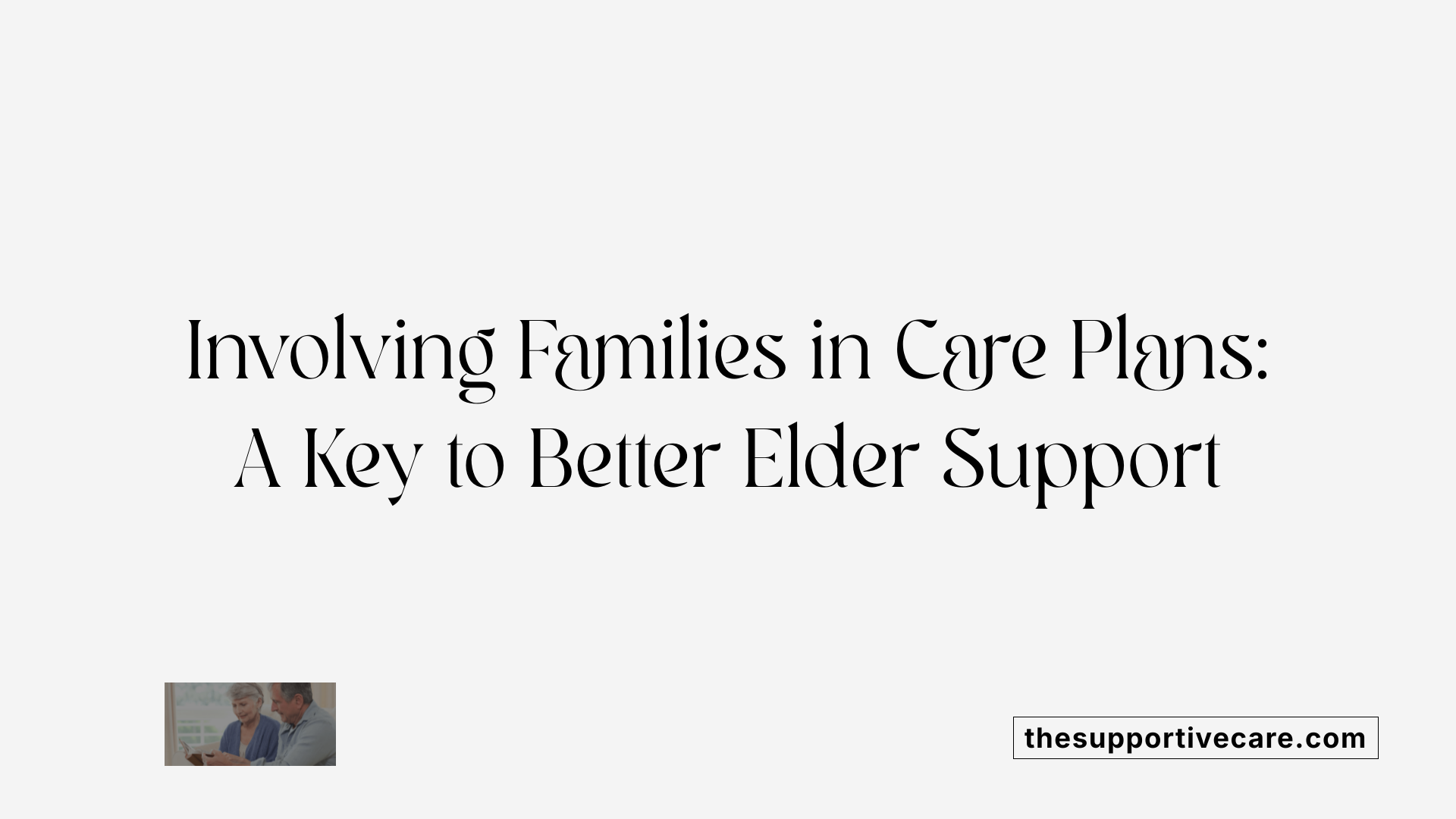
How can care plans for seniors include family members effectively?
Including family members in senior care plans is essential for providing comprehensive and personalized support. Effective strategies involve actively involving trusted relatives and friends early in the decision-making process. This inclusion helps to ensure that the senior’s preferences and needs are fully understood and respected.
A foundational step is providing thorough education about the senior’s health conditions, treatment options, and daily care requirements. When family members understand what is involved, they can better support adherence to care plans and advocate for the senior's well-being.
Establishing clear communication channels is vital. Regular updates, feedback opportunities, and open dialogue help reduce misunderstandings and foster trust. Family participation in scheduled meetings with healthcare providers ensures everyone stays informed and aligned.
Respecting the senior's autonomy and preferences should always be prioritized. Participating in shared decision-making empowers seniors, promotes dignity, and enhances their sense of control over their lives.
Assigning specific caregiving responsibilities based on each member’s strengths and availability creates a balanced, manageable support system. Promoting collaboration among healthcare professionals, the senior, and family members cultivates a cohesive environment conducive to better health outcomes.
Regular family meetings and clearly defined roles strengthen relationships and create a shared sense of responsibility. This teamwork not only improves adherence to care plans but also reduces stress and potential conflicts.
Healthcare providers play a crucial role in facilitating this process. By collaborating closely with families and seniors, they can develop personalized, realistic care plans that reflect the senior’s wishes and medical needs.
In sum, an inclusive approach that emphasizes early involvement, education, clear communication, respect for autonomy, shared responsibilities, and professional collaboration ensures that family involvement enhances care quality. It fosters a supportive environment where seniors can thrive with dignity, better health, and emotional well-being.
Strategies to Promote Family Visits and Social Engagement
What are practical methods to encourage family visits and social engagement for seniors?
Encouraging regular family visits and social activities is vital for maintaining seniors' mental and emotional health. Practical approaches include scheduling consistent visits, which help establish routines that seniors can anticipate and benefit from. Family members can also participate in shared activities such as gardening, cooking, or walks, fostering stronger bonds.
Technology plays a significant role as well. Tools like video calls, social media, and messaging apps enable seniors to stay connected even when in-person visits are limited. These virtual interactions help combat loneliness and provide emotional support.
Organizing community-based and intergenerational activities—such as group exercise classes, art workshops, or shared meals—can boost social bonds and promote a sense of belonging. Many programs are designed to engage seniors actively, encouraging participation in physical and social pursuits.
Supporting caregivers through education and providing resources is essential. When caregivers understand the importance of social engagement, they are better equipped to facilitate social interactions and reduce feelings of isolation.
Additionally, integrating structured routines and encouraging involvement in volunteer initiatives or community programs promote mental, emotional, and physical well-being.
Overall, combining consistent visits, digital connections, community activities, and supportive caregiver strategies creates an environment that fosters ongoing social engagement and enhances the quality of life for seniors.
Effective Strategies for Family Involvement in Mental Health Care
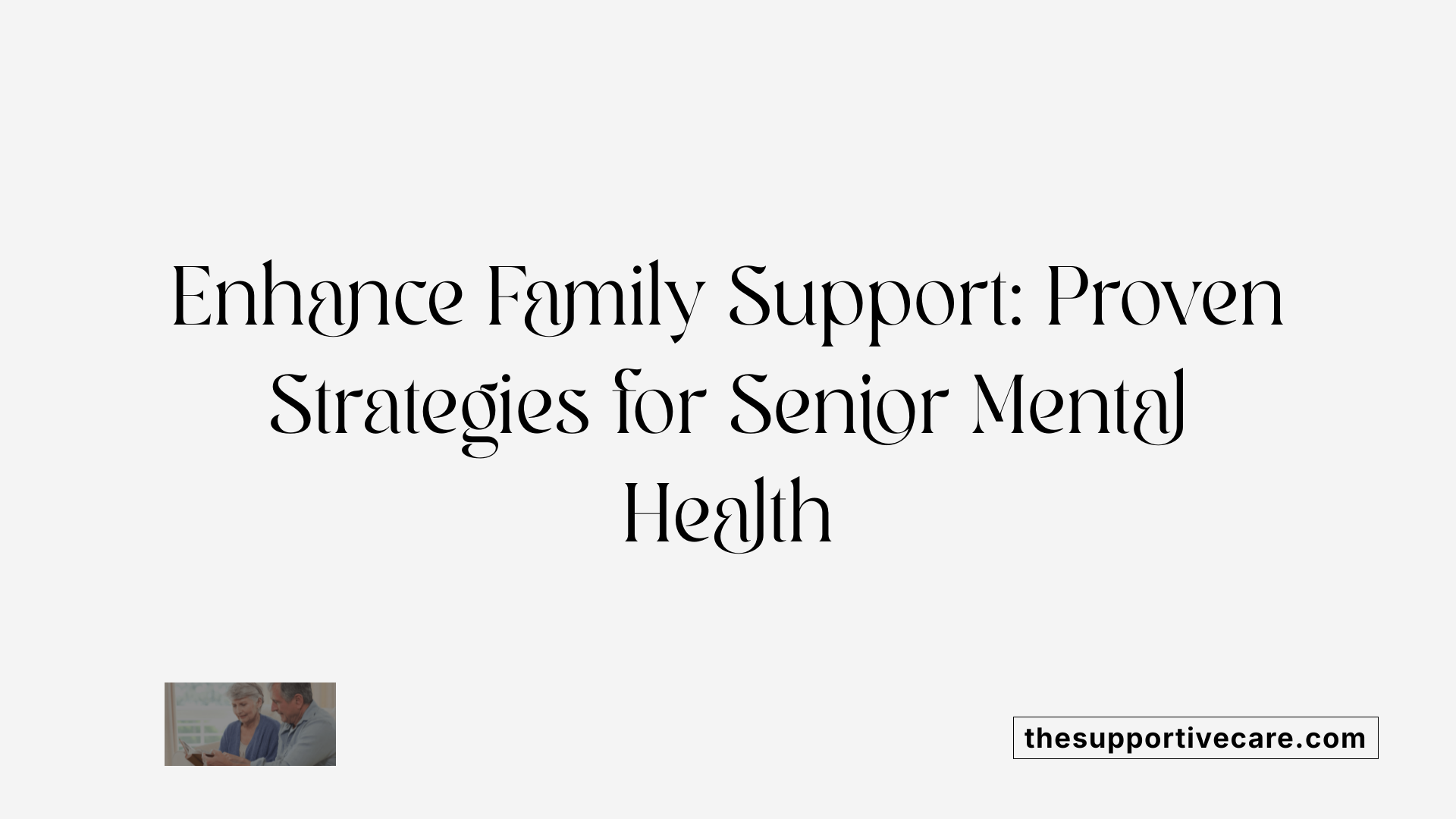
What are effective strategies for involving family in senior mental health care?
Involving family members in the mental health care of older adults is essential for improving treatment outcomes and ensuring a supportive environment. One of the most effective approaches is to provide comprehensive psychoeducation. This involves educating families about mental health conditions common among seniors, such as depression, dementia, or anxiety, to increase their understanding and reduce stigma associated with mental illness.
Reducing stigma is crucial because it encourages open communication and helps families support their loved ones without feelings of shame or embarrassment. When families understand mental health issues, they are better equipped to recognize symptoms early and facilitate timely medical intervention.
Engagement in care planning and regular assessments fosters collaborative decision-making. This ensures that care strategies are aligned with the older adult’s preferences and needs, promoting dignity and autonomy. Family members can also benefit from counseling, training, and access to resources like support groups or community programs. These services help caregivers build coping skills, manage stress, and develop practical strategies for supporting seniors.
Utilizing primary care providers and community-based organizations can make family involvement more accessible and less intimidating. These entities can serve as trusted points of contact, making it easier for families to participate actively.
Finally, fostering positive family dynamics—such as open and empathetic communication, conflict resolution, and establishing routines—contributes significantly to mental health. When families work together harmoniously, they can create a stable environment that promotes emotional well-being and improves adherence to treatment plans.
Guiding Families in Mental Health Decision-Making
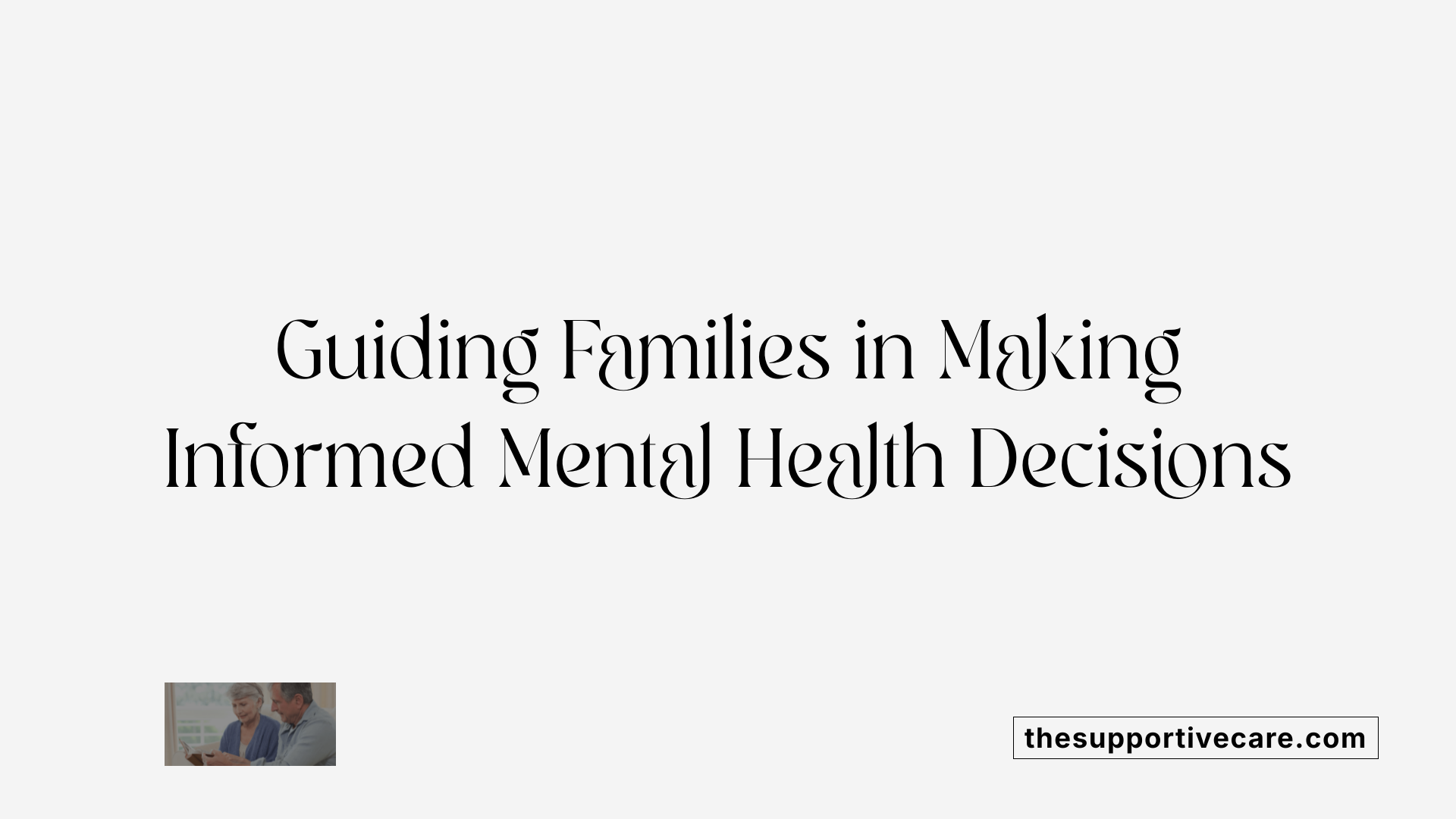
How can families be educated and guided to make informed decisions about senior mental health care?
Supporting families in making informed decisions about senior mental health involves providing accessible, clear, and comprehensive educational resources. These resources should cover common mental health conditions like depression, dementia, and anxiety, along with available treatment options and effective caregiving strategies. Knowledge empowers family members to recognize warning signs early and understand when professional assistance is necessary.
Open and empathetic communication within families forms the foundation of good decision-making. By fostering honest conversations, family members can better address the emotional needs of older adults, promoting trust and collaboration in care planning. Including seniors in discussions respects their independence and dignity, ensuring their preferences are honored.
Collaborating with healthcare professionals, such as geriatric mental health specialists, provides families with expert guidance and reassurance. Many communities offer support groups and educational programs that enable families to exchange experiences, learn practical tips, and gain emotional support.
Encouraging participation in community activities or social groups helps combat loneliness and social isolation, which are closely linked to mental health issues in seniors. Supporting involvement in hobbies, exercise, and social engagement improves overall well-being.
Finally, training family caregivers to identify early signs of mental health deterioration and knowing when to seek professional help can ensure timely intervention. By understanding when symptoms exceed basic care, families can help prevent crises and promote better health outcomes.
Supporting Families to Improve Mental Health Outcomes
What approaches support and engage family participation to improve senior mental health outcomes?
Effective strategies to involve family members in supporting senior mental health include several evidence-based approaches. Psychoeducation plays a vital role by helping families understand mental health conditions, recognize early warning signs, and learn effective ways to respond. This knowledge empowers families to support their loved ones proactively and confidently.
Family therapy is another important tool, addressing systemic issues within the family unit, improving communication, and resolving conflicts that may impact the mental wellbeing of older adults. It creates a safe space for discussing challenges and finding collaborative solutions.
Providing tailored support and resources to caregivers reduces their stress and burnout. This includes caregiver education, practical assistance, and access to support networks or groups. Family assessments help identify specific needs and strengths, enabling personalized intervention plans.
Fostering positive communication within families encourages open and empathetic interactions. When family members are involved in decisions, older adults often experience greater satisfaction and a sense of control, which supports their mental health.
Encouraging social engagement through community, intergenerational activities, and support groups promotes social connectedness, reducing feelings of loneliness and isolation. Use of technology, such as videoconferencing or mental health apps, can help maintain regular contact and engagement.
Integrating families into care plans within primary care settings or community programs enhances adherence to treatment and reduces hospitalizations. Addressing challenges such as stigma and family conflicts is essential for sustained engagement.
In summary, approaches that involve psychoeducation, family therapy, social activities, and tailored support create a supportive environment conducive to positive mental health outcomes for seniors. These strategies strengthen family bonds and ensure that older adults receive comprehensive, compassionate care.
For more information, searching 'Family participation in elder mental health support' can provide additional resources and guidance.
Resources and Tools for Family Engagement in Elder Care
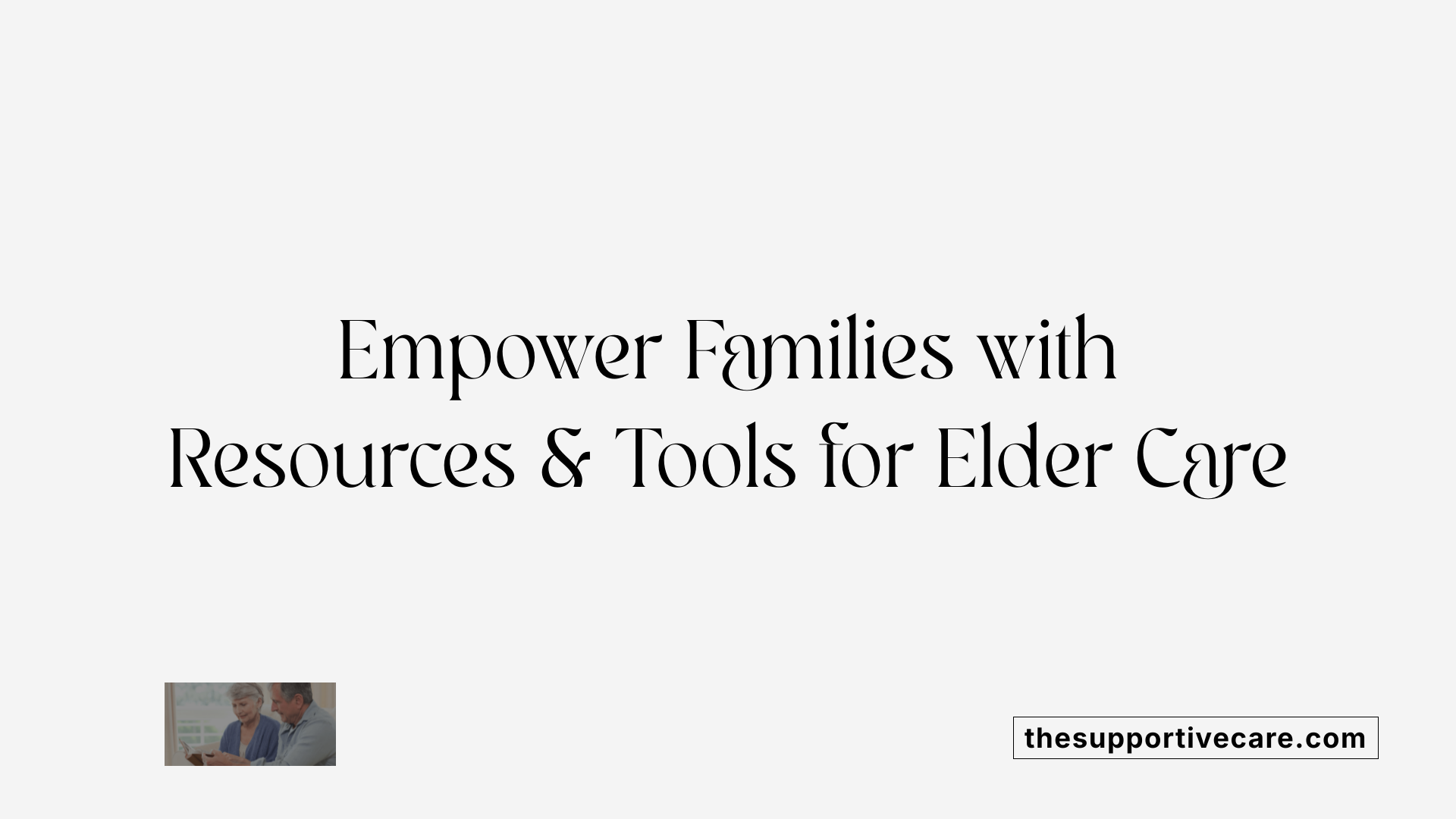 Families seeking to improve their involvement in elder care have access to a variety of resources and tools designed to support their efforts. Educational programs such as the National Alliance on Mental Illness (NAMI)’s Family-To-Family course offer free, eight-session training that equips family members with essential knowledge about mental health conditions, effective communication, and caregiving strategies. Support groups like NAMI’s Family Support Group provide emotional support and shared experiences, helping caregivers cope with stress and isolation.
Families seeking to improve their involvement in elder care have access to a variety of resources and tools designed to support their efforts. Educational programs such as the National Alliance on Mental Illness (NAMI)’s Family-To-Family course offer free, eight-session training that equips family members with essential knowledge about mental health conditions, effective communication, and caregiving strategies. Support groups like NAMI’s Family Support Group provide emotional support and shared experiences, helping caregivers cope with stress and isolation.
Community organizations also deliver locally based programs, often facilitated by trained volunteers, that focus on caregiver education, mental health awareness, and skill-building. For those unable to attend in person, online platforms and telehealth services have become valuable, enabling remote participation in support groups, educational sessions, and counseling.
Numerous evidence-based resources from agencies such as the Substance Abuse and Mental Health Services Administration (SAMHSA) offer toolkits, guides, and tailored programs. For example, SAMHSA’s 'Get Connected' initiative and 'Supporting the Mental Health Needs of Older Adults' provide families with practical guidance on recognizing symptoms, promoting resilience, and accessing care.
The U.S. government’s National Family Caregiver Support Program (NFCSP) provides grants to community agencies that deliver caregiver training, respite care, counseling, and access assistance. These services help families manage caregiving responsibilities without burnout.
Technology tools have also become integral in elder care. Mobile apps facilitate medication management, appointment reminders, and symptom tracking. Videoconferencing platforms allow for continuous connection with healthcare providers and mental health specialists, especially important for caregivers who manage loved ones from a distance.
By utilizing these resources, families can develop better strategies for supporting their older loved ones’ mental and physical health, ensuring compassionate, informed, and effective care.
Evidence-Based Practices to Foster Family Involvement
What are evidence-based practices for fostering family involvement in senior mental health support?
Supporting the mental health of older adults benefits greatly from strategies that actively involve families. Proven methods include adopting family-centered care models that emphasize collaboration between healthcare providers and families. These models prioritize understanding the family’s role and fostering a supportive environment.
Psychoeducation is also essential. It helps family members better comprehend mental illnesses common among seniors, such as depression, dementia, or Alzheimer’s disease. Educated families can recognize early warning signs, support medication adherence, and participate effectively in care routines.
Early engagement is another crucial element. Involving families from the initial stages of assessment and treatment planning can reduce symptom severity and improve adherence to care. This proactive approach ensures families are equipped to handle upcoming challenges.
Effective communication plays a vital role. Clear, consistent dialogue between healthcare teams and families builds trust, encourages information exchange, and promotes shared decision-making. Regular updates and empathetic listening help families feel included and valued.
Tailoring support to individual family needs enhances outcomes. Assessment tools identify family strengths, dynamics, and areas requiring intervention. These insights allow for personalized strategies such as family therapy, which helps resolve conflicts and develop functional communication patterns.
Building strong relationships through ongoing interaction benefits all involved. When families feel supported and empowered, they are more likely to stay engaged, reduce their stress, and provide better care. These practices collectively lead to improved mental health results for seniors, stronger family bonds, and a more resilient community support network.
In summary, implementing family-centered care, providing targeted education, engaging early, maintaining open communication, and customizing support are proven ways to enhance family involvement. Such approaches foster better mental health support for older adults and promote healthier, more connected communities.
Strengthening Family Ties for Better Aging and Mental Wellbeing
Involving family in senior mental health care is not just beneficial but essential for fostering emotional stability, health resilience, and quality of life among older adults. By understanding their roles, leveraging practical strategies, and utilizing available resources, families can effectively support mental wellbeing, reduce loneliness, and promote holistic health. A combination of early planning, transparent communication, educational initiatives, and community engagement creates a supportive environment where seniors can thrive with dignity and independence. As research continues to underline the importance of family in aging well, embracing these evidence-based approaches will be pivotal in achieving positive mental health outcomes for our aging population.
References
- Family Involvement in Senior Patient Care
- The Role of Family in Geriatric Mental Health
- How Family Visits Impact Older Adults' Mental Health in ...
- Involving Family Members in Senior Care Planning
- Mental health care for older adults: recent advances and ...
- How to Support Senior Mental Health at Home
- Older Adults and Mental Health: A Guide to Well-Being
- How to Engage Caregivers in Evidence-Based Programs


































































































